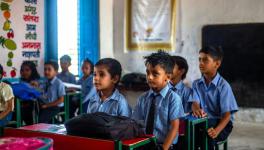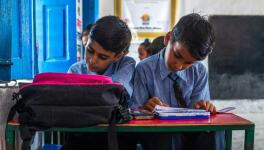Academics Criticise IIT Kanpur’s Report Praising “UP Model” of Handling the Pandemic
IIT-Kanpur's (IITK) report praising the 'UP Model' of dealing with the COVID-19 pandemic has omitted important details, and has a faulty premise, claimed a recent report published by the IITK Citizen's Forum and Hamara Manch IITK. The organisations have also released a statement about the IITK report, which said, "The report itself is an uncritical reproduction of government data and the details of government programs, with the transparent aim of making it appear as if the Government of Uttar Pradesh has managed the pandemic better than any other state. Many of its claims are unsubstantiated, its conclusions are often exaggerated, and its data is presented in an obfuscatory manner."
The IITK report, titled COVID War, UP Model: Strategies, Tactics, Impact, authored by Professor Manindra Agrawal, was published on October 11, 2021. The report claimed to analyse the UP Model, or the strategy of "handling of the pandemic by the state of Uttar Pradesh based on the data collected from multiple sources" using "SUTRA, a mathematical model developed for predicting the trajectory of the pandemic". The report concludes that the UP Model was a resounding success on all counts "that the steps deployed by the UP government helped in minimising the impact of COVID, maintaining the economic progress, and providing livelihood to the large influx of migrant labour".
The critique of the report, published by the IITK Citizen's Forum and Hamara Manch IITK, argued that contrary to what the IITK report said, the livelihood of the citizens of UP, especially the marginalised and migrant worker population, were adversely impacted, the UP government failed in augmenting the healthcare infrastructure. The death counts and the SUTRA model is fundamentally flawed.
The IITK report has a glaring omission. It does not attempt to estimate the number of people who died in the state during the pandemic, let alone investigate the reasons for the deaths. In a passing reference on page 99 of a 100-page report, it says that it would take another year to know the correct death figures.
The critique said, "It even dismisses the horrific images of bodies floating on the Ganges and strewn all along the banks as traditional practices. An informed estimate suggests that around 100 million people were infected during the second wave in UP and the death toll was anywhere between 250,000 to half a million. The IIT report becomes almost farcical if it does not even engage with the number of dead."
According to the IITK report, the UP model is based on the premise that returning migrant workers from other states could play a significant role in spreading the virus. Hence, the stated strategy of outbreak prevention was mainly focused on them. However, the critique said, "It is important to note that only about four lakh migrant workers returned during the second wave as per their data. And what the report is completely silent about are at least two events which happened in defiance of the looming second wave, or rather what probably caused the second wave in UP – the Panchayat Elections and the Kumbh Mela."
The organisations also criticised the SUTRA (Susceptible, Undetected, Tested (positive) and Removed Approach) model, a mathematical model used by the government to fight the second wave of the COVID-19 pandemic. The critique said that several experts have found serious flaws in the model, including the most crucial one of completely failing to predict the possibility of a second wave and its virulence, even when the second wave was on. The SUTRA model relied on too many parameters and recalibrated those parameters whenever its predictions "broke down", it said.
The critique said that the report seems like a motivated exercise of giving a clean chit to both the SUTRA model and the government that followed its predictions. The only data sources used by the IITK report are from the same government, and no independent fact-checking was conducted. None of the several well-researched ground reports on the acute shortage of medical care, endless lines for hospital beds, queues for oxygen cylinders, inundated crematoria, the overwhelmed medical staff, the distress and panic of the caregivers and patients were referred to. It said, "The entire report is filled with several methodological discrepancies of uneven scales, arbitrary use of per capita and absolute numbers, comparisons across states without normalisation of data, cherry-picking data, repetitions, irrelevant graphs and figures which do not add to the understanding of the issue under consideration, etc."
In their statement, which has been endorsed by hundreds of academics, students, and concerned citizens from all over the world, the organisations said, "On reviewing the reportage from Uttar Pradesh during the second wave, it becomes abundantly clear that the response of the UP government to the pandemic was woefully insufficient. The impact of these failures on many lakhs of working people has been staggering, and we are yet to fully appreciate the damage that has been done. This report is far from an honest appraisal of government policy, and serves no purpose other than to bolster the faulty science of its authors and the flawed policies of the state government."
The statement also condemned the fact that the Director of IITK, Abhay Karandikar, wrote a foreword endorsing the findings of the IITK report. It added, "We condemn this effort to use IIT Kanpur's imprimatur to whitewash the UP government's gross mismanagement of the pandemic."
Get the latest reports & analysis with people's perspective on Protests, movements & deep analytical videos, discussions of the current affairs in your Telegram app. Subscribe to NewsClick's Telegram channel & get Real-Time updates on stories, as they get published on our website.
























